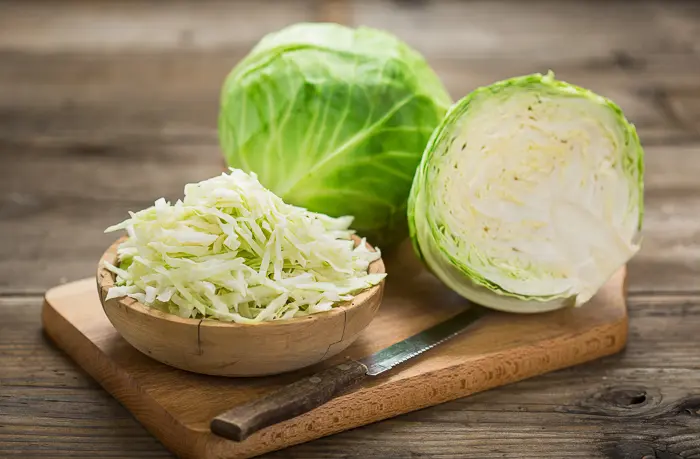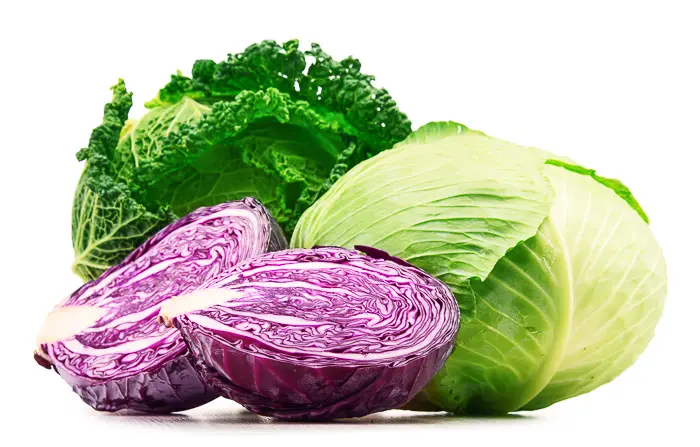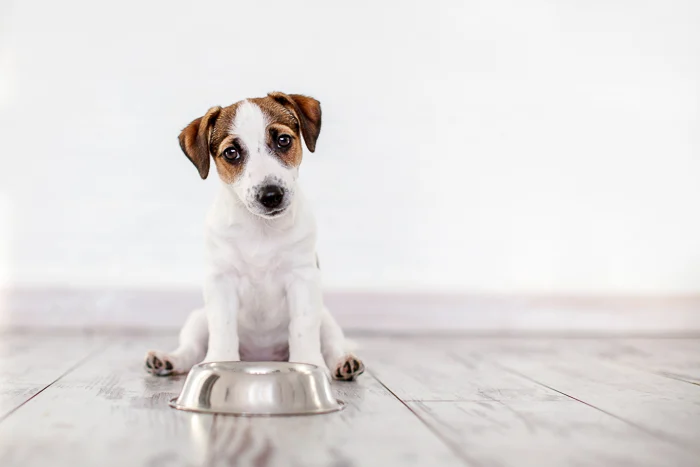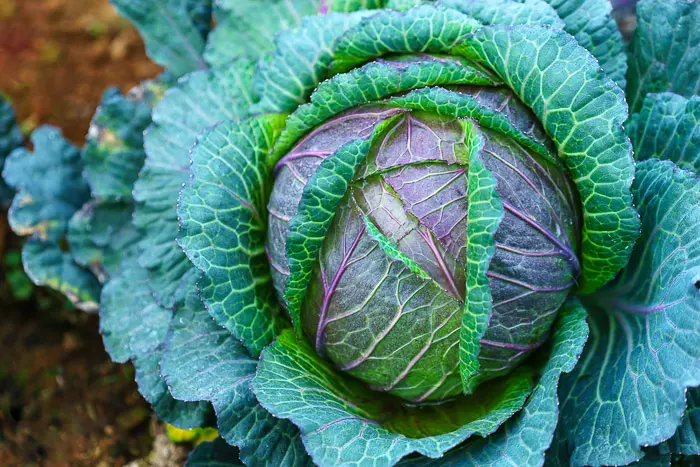Can your canine companions eat cabbage or foods with cabbage in them? Can dogs eat cabbage in general? If you want to human foods such as cabbage to your dog's diet, read this article first, as many foods that are safe for us to eat, are harmful to your pup!
Dr. Jess describes the risks and the benefits of feeding cabbage to your dog, as well as which types of cabbage dogs should even eat, and which varieties are best left out of their food bowl.

Dog food experts have arguments regarding the safety of serving certain cabbages to dogs.
Well, as crunchy and crisp as cabbage is, is it actually a health threat to the dogs or are we overreacting over this vegetable?
Let me, the veterinarian, explain my thoughts…
It’s always the best idea to double-check which foods your dog can and can not eat because many foods that are safe and healthy for humans are actually very harmful for your dog to eat, or even poisonous or deadly to them. Taste is never worth the risk of harming your pet.
That's why I am so glad that you are here making an informed decision before feeding your dog cabbage!
What Do Dogs Eat?
Just like some humans, there are some dogs that are just not picky about what they eat. They’ll eat whatever you offer them- they're like vacuum cleaners sucking up anything you put in front of them and then some.
Some dogs are on the pickier side of things – which may be an issue if you offer your dog cabbage, but I'll get to that here in a little bit.
Pickier pups can be harder to properly feed because they just won't eat any food we give them. Try feeding a picky dog something like okra!
A common canine diet for pet dogs consists of a complete dry or wet food and possibly some form of supplements in some specific cases (however, not all pet dogs need supplements to live a healthy lifestyle).
Foraging can also be included in the diet if the dog is allowed to roam, or the dog is feral, and of course there are treats that are a part of many dog's diets!
The diet of every dog breed will very when you are looking into a healthy and complete diet for your pup.
Other things that your vet will consider when discussing proper diet for your dog, is their lifestyle, age, and any medical issues that they have or are prone to getting in the future as they age.
So it is important to know when offering food to your dog, what constitutes a healthy choice, and what does not.
An improper diet could put your dog at risk of having problems properly digesting their food and absorbing nutrients correctly. And we don’t want that now do we?
So let’s talk specifically about cabbage, since that's why you clicked over here today, and talk about how it could affect your dog’s overall health and well-being.
Let's Talk Cabbage…
Cabbage is a common type of vegetable.
It is a large leafy green that is popular part of salads and other savory meals.
It can be eaten raw in salads or shredded and added to stir fry. Others will cook it down by steaming or sauteing it and adding it to other dishes.
This vegetable comes in many different varieties, including red or purple, napa, savoy, and green cabbages.
The cabbage plant itself grows along the ground and is a similar plant to broccoli and cauliflower.
Cabbage Nutrition:
Just like with any other vegetable, cabbage has its nutritional value…. as well as some things to be weary of.
Vitamins:
Cabbage contains vitamin B, C, and K [source]. Vitamin C is essential to your pet staying happy and healthy and having a strong immune system.
Minerals:
Cabbage contains essential minerals too, such as potassium, calcium, and phosphorus, which are all needed to maintain healthy body functions.
Antioxidants:
Cabbage contains antioxidants that may help to prevent cell damage that harmful free radicals can cause. These antioxidants can help with things like preventing certain cancers and diseases.
Sugar Content:
Cabbage has a low sugar content as well.
Something to take note on and to keep in mind when feeding to dogs who can come down with digestive upset with large amounts of sugar!
Water Content:
Cabbage also contains a high percentage of water, which is great when looking to maintain hydration. But too much water can be troublesome!
Fiber:
Cabbage contains fiber.
This fiber helps decrease the chances of constipation and improves gut motility.
Too much fiber however, can lead to too much gut motility… and that's not a good thing either!

Can You Feed Cabbage To Dogs?
While cabbage is not toxic to dogs and can be quite beneficial to some dogs, too much cabbage could lead to some health problems.
Let me dive a little deeper and explain myself so you can make an informed decision on whether or not you should let fido eat cabbage off of your plate.
Do Dogs Like Cabbage?
Dogs are natural carnivores.
Some dogs find the flavor of cabbage to be a delicious one, just as some people love cabbage, from their salads to their baked dinners.
So yes, some dogs like cabbage. Some dogs even LOVE it.
Other dogs will definitely turn their nose away from the veggie.
Can Cabbage Be Harmful to Dogs?
Before we can decide whether cabbage is safe to feed our dogs, we need to first understand some of the risks involved if we do feed our dogs cabbage.
I am not saying that you shouldn’t have any concerns with feeding your dog cabbage, because there are a few key things to keep in mind.
These three factors to keep in mind include:
Harmful Reason #1: Loose Stool/Diarrhea
Too much fiber can mean hypermotile, or increased movement, of one's digestive tract.
Some dogs are more sensitive to additional fiber in their diets, so they are more likely to have loose stool and in some cases, full-blown diarrhea.
Other dogs will not be impacted by any additional fiber in their diets.
Many dog owners also report that their dog has increased flatulence after eating cabbage.
This is very common and typically go away after the increased gas is removed from their systems.
If your dog acts uncomfortable due to extreme gas from their cabbage treat, stop offering them cabbage and contact your veterinarian immediately.
Harmful Reason #2: Allergic Reaction to Cabbage
A dog can develop an intolerance or an allergy to any food, so there is always the possibility that your dog is allergic to cabbage.
If you suspect your dog is allergic to cabbage, do NOT feed it to your dog.
If your dog is allergic to cabbage and accidentally ingests it, go to your nearest animal emergency room immediately.
When this happens, the attack sets off a hypersensitivity reaction and can result in any of the following symptoms:
Common symptoms of adverse/allergic reaction to food:
- Nausea/vomiting
- Diarrhea
- Itching/Increased grooming
- Fever
- Lethargy
- etc.
Harmful Reason #3: Thiocyanate
There is a natural compound in cabbage called thiocyanate that can add up and affect your dog is fed cabbage in large quantities.
This thiocyanate compound can affect the dog's thyroid gland and cause hypothyroidism in your dog.
This is highly unlikely if you feed your dog the small amounts recommended of cabbage.

How Much Cabbage Can a Dog Eat?
This depends on the specific dog in question. Most the time, cabbage, given in small amounts periodically, is most likely just as healthy for your dog as it is for you.
Moderation is key here; never go overboard when feeding cabbage to your dog, no matter if your dog has a stomach of steel or not. Small amounts every once in a while is okay for most dogs.
Smaller dogs do not need as much cabbage as a larger dog to have the same effect.
Dogs with loose stool do not need to be fed any cabbage at all.
The best thing to do to gauge how much cabbage you should be feeding your dog safely, would be to contact your veterinarian about the specific pet in question.
Is Cabbage Beneficial For Dogs?
The random taste of cabbage or a small bite as a treat is totally fine – it will not harm your dog.
However, there’s no need to offer it in large quantities, as this can cause some major health issues for your pup, as I discussed above.
Basically, if your dog consumed a bit of cabbage, you don’t need to drive them straight to the vet to get their stomach emptied.
If they start showing any odd signs of being affected by this new food (a list of signs and symptoms to look out for is further down in this article), contact your local veterinarian to get more information on what to do next.
So, yes there are some negative effects that can be seen with some dogs who consume cabbage.
However, this does not mean that a large number of dogs see many more health benefits versus those few health concerns.
Some of the health benefits for dogs who consume cabbage include:
- High Fiber: Fiber is great to keep the digestive system flowing smoothly and also helps dogs feel satiated (feeling full for longer after eating).
- Low Calorie: If your dog is overweight, you are liking looking for low calorie options for treats, etc.
- Low Fat: Again, if you are looking for lower-fat options to serve your overweight dog, may be a good add-on option.
- Vitamins, Minerals, Antioxidants: A has many different vitamins, minerals, and antioxidants to help keep your dog happy and healthy.

Can Dogs Eat Raw Cabbage?
Most dogs could handle a bit of raw cabbage if offered to them in a size that they could safely eat it without choking.
Some dogs do not like the taste of raw cabbage, so don't be shocked if your pup tells you no thanks to raw cabbage.
However, most dogs will not eat a raw cabbage when offered. Instead, offering them a cooked cabbage is the way to go.
Make sure that the cabbage is fresh and not overly ripe or rotten no matter what way you are deciding to prepare it.
Can Dogs Eat Roasted Cabbage?
Yes, dogs can eat roasted cabbage, as long as no seasonings or other cooking products were used in the cooking process.
Your dog will be much more likely to accept cooked cabbage from you due to the softer texture and stronger smell compared to if you were going to try and offer them raw cabbage.
How to Serve Cabbage to Dogs:
After checking with your vet to make sure that cabbage should be a part of your dog's menu, start by offering your dog 1 teaspoon worth of cabbage.
If your dog does not show any adverse reactions after 24 hours or more, then you are likely safe to continue feeding your pup cabbage, gradually increasing the amount according to your vet's guidelines.
how-to guide here……….
Keep the following in mind when serving food to your dog:
And remember that dogs need more than a bowl or plate of cabbage – they need a complete and balanced diet.
Whichever complete food you choose for your dog, it needs to have the AAFCO label indicating the diet is complete and balanced for your dog’s life stage.
AAFCO approved foods have gone through testing and compliance to make sure that the diet is safe and healthy for your pet.
Dogs already get everything that they need from their kibble or canned food.
How Much Cabbage Can My Dog Have?
Can dogs eat cabbage? As I mentioned previously, they can eat cabbage.
Most dogs are safe consuming cabbage if they are a healthy adult dog.
A smaller dog will be good with a bite or two of cooked cabbage, while a large or giant-size dog could handle a few more morsels or bites of cooked cabbage after a ‘ramping up' period.
So don't give your large dog an entire plate of cooked cabbage the very first time they eat the veggie!
Too much cabbage can lead to digestive upset, increased flatulence (stinky stinky dog gas!), and other bodily conditions.
I highly recommend contacting your vet first before starting your dog on cabbage, and also suggest that you start by offering your pup a small amount of cabbage and then working up to a full amount (AKA a ‘ramp up‘ period).
A little bit of cabbage typically goes a long way!
It's always better to be safe than sorry!
Talk to your vet about the appropriate serving size of cabbage for your dog.
Can Puppies Eat Cabbage?
I would never advise a puppy owner to feed cabbage to their puppy unless your veterinarian is recommending it due to specific medical needs.
Why do I say this? Because your pup's first months of life should consist of specialized puppy diets approved by your local veterinarian upon puppy examination.
Puppies tend to have an even more delicate digestive system than adult dogs so giving your puppy cabbage might cause diarrhea, vomiting, or other adverse reactions.
Find Out If Your Dog Can Eat These Foods!
- Bananas
- Fish
- Tomatoes
- Potatoes
- Mayo
- Pumpkin
- Tuna
- Kiwi
- Radishes
- Mashed Taters
- Brussels Sprouts
- Basil
- Salmon
- Slugs
- Christmas Cactus
What to do If Your Dog Eats Cabbage:
If it is just a bite or two of cabbage, just watch them for the next 24 hours – just in case, for any signs of adverse reaction.
If you are concerned with this small amount, of course, contact your veterinarian right away. Most dogs can tolerate a small amount of cabbage on occasion and do just fine.
If it is a large amount of cabbage, contact your veterinarian right away to discuss details and what to do next.
In the later case, it is extremely likely that your vet will request that you bring your dog in immediately to get evaluated if they have gotten themselves into a large amount of cabbage, or a rotten cabbage.
We vets want to help and we will best help if we are notified right away.
Trust me, us vets are happy to help!

The information provided in this article is not a substitute for professional veterinary help.
![[Vet Explains Pets]](https://vetexplainspets.com/wp-content/uploads/2024/09/cropped-vetlogo-199x66.png)
